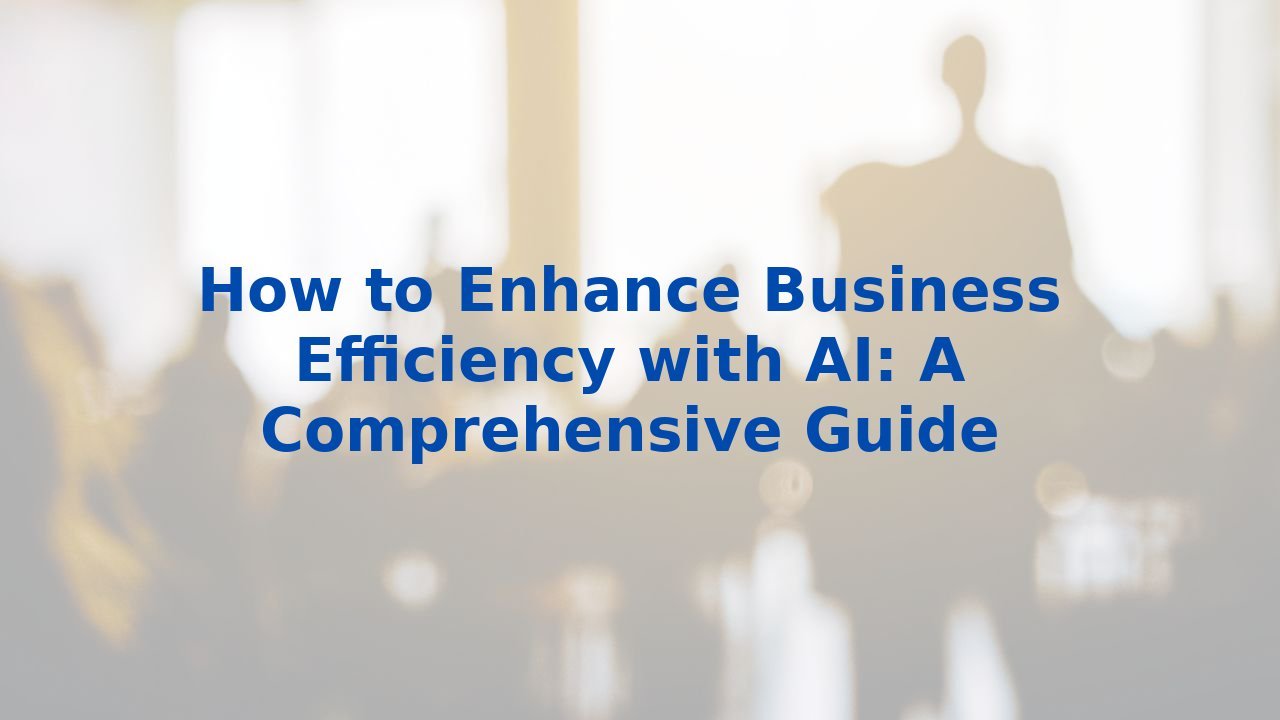How To Enhance Business Efficiency With AI: A Comprehensive Guide
How To Enhance Business Efficiency With AI: A Comprehensive Guide
In an era marked by rapid change, businesses strive not only to survive but to thrive. Efficiency is the name of the game, and the winning ticket often lies in the integration of Artificial Intelligence (AI) into everyday processes. The advancements in AI are transforming how organizations operate, making them more nimble and responsive. Let’s dive into the essential ways AI can enhance various business processes and the significance of employee training in this technological revolution.
The Rise of AI in Business
AI is not just a buzzword; it’s a harbinger of change. From streamlining customer service to enhancing data analysis, the applications of AI are vast and transformative. Consider these key areas of impact:
Customer Service
Imagine a world where customer inquiries are addressed within seconds, any time of day. AI has made this possible through the use of chatbots and virtual assistants. These intelligent systems can manage queries efficiently, allowing human representatives to focus on more complex interactions. This automation reduces response times and enhances customer satisfaction—both crucial for building long-term relationships.
Data Analysis
The digital age has unleashed a torrent of data. Here’s where AI shines, utilizing sophisticated algorithms to sift through vast datasets at lightning speed. It identifies patterns and trends, providing organizations with actionable insights. With AI in the driver’s seat of data analysis, businesses can make informed decisions that shape their strategies.
Marketing
Marketing in the age of AI is an opportunity to personalize the consumer journey. AI-driven tools allow businesses to tailor their campaigns based on customer preferences and behaviors. By delivering personalized content, companies can vastly improve their advertising effectiveness and resonate with their audience on a deeper level.
Benefits of AI for Improving Efficiency
The impacts of AI extend far beyond basic automation. Here’s how the integration of AI enhances efficiency across the board:
Increased Productivity
When AI handles repetitive tasks, it liberates employees to dedicate their time to more strategic and creative endeavors. This shift not only boosts morale but also enhances overall productivity, allowing teams to innovate and excel.
Enhanced Decision-Making
The phrase “data is the new oil” holds true in today’s landscape. With AI harnessing data to provide real-time insights, businesses can make informed decisions swiftly. The traditional slow decision-making process becomes a rapid response system, ensuring organizations stay agile.
Cost Savings
AI can drive significant cost reductions by minimizing the need for manual labor on repetitive tasks. This economic efficiency not only benefits the bottom line but also allows for reallocation of resources to vital business areas.
Improved Customer Experience
By leveraging AI, businesses can offer personalized experiences that cater to individual preferences. A satisfied customer is more likely to return, ensuring loyalty and long-term growth.
The Importance of Training Employees for AI
Integrating AI into business processes requires a workforce that understands how to leverage it effectively. This necessity highlights the importance of training employees in AI technologies:
Skill Development
It’s essential that employees are well-acquainted with AI tools. Training programs equip them with the skills necessary to formulate effective prompts and interpret results correctly, enabling them to harness the full potential of AI.
Ethical Considerations
AI comes with a set of ethical challenges that must be navigated responsibly. By fostering an understanding of these ethical implications through training, businesses ensure that their workforce makes decisions rooted in integrity and responsibility.
Adaptability
The pace of technological advancement is relentless. A well-trained workforce is not only adept at using current AI tools but is also adaptable, ready to learn and embrace new skills as the landscape evolves.
Conclusion
The integration of AI into business processes is more than an upgrade; it’s a necessity for organizations aiming for efficiency in a competitive global landscape. Yet, embracing AI technology alone isn’t enough. Investing in a comprehensive training approach for employees is crucial for maximizing the benefits of AI and ensuring a successful transition.
In this dynamic environment, businesses that marry the power of AI with a skilled workforce will find themselves not only at the forefront of innovation but also champions of productivity, decision-making, and customer satisfaction. As the future unfolds, fostering a culture of learning and adaptability will be the cornerstone of organizational success.



